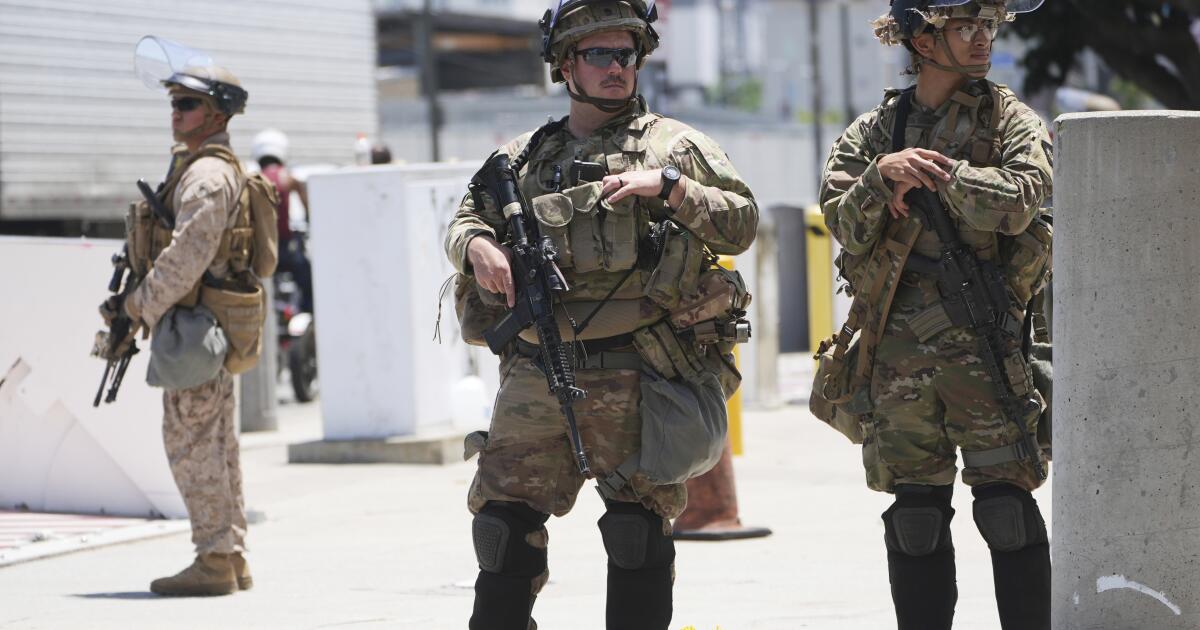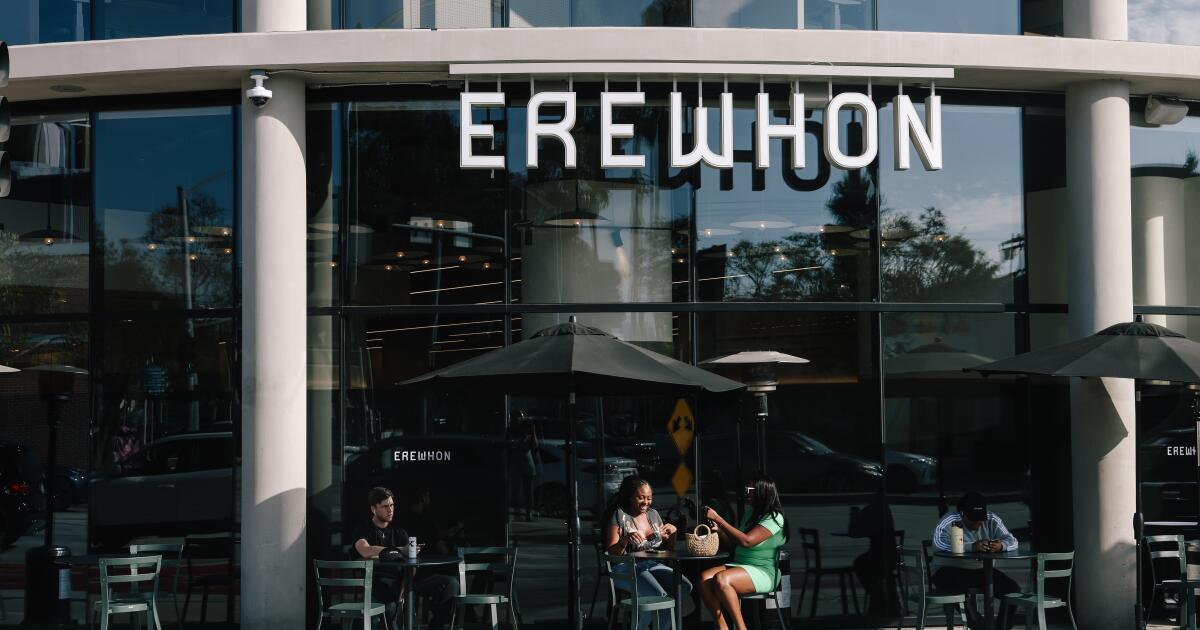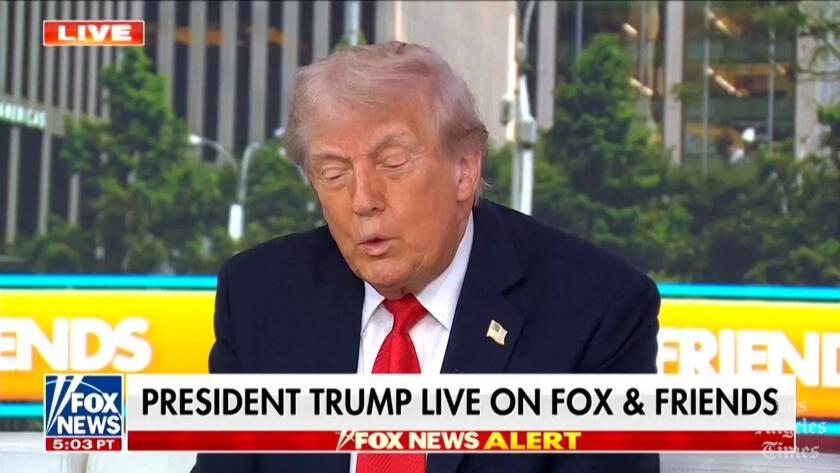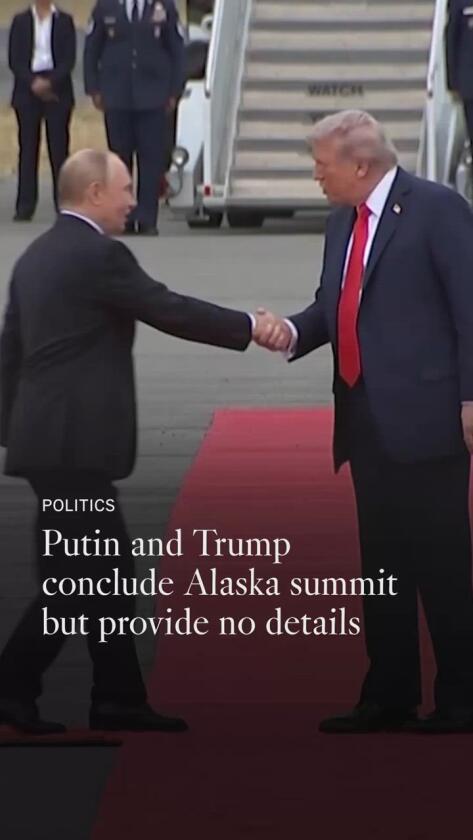
President Trump’s decision to deploy hundreds of National Guard troops to Washington has California officials on high alert, with some worrying that he intends to activate federal forces in the Bay Area and Southern California, especially during the 2028 Los Angeles Olympics.
Trump said that his use of the National Guard to fight crime could expand to other cities, and suggested that local police have been unable to do the job.
Legal experts say it is highly unusual and troubling for forces to be deployed without a major crisis, such as civil unrest or a natural disaster. The Washington deployment is another example of Trump seeking to use the military for domestic endeavors, similar to his decision to send the National Guard to Los Angeles in June, amid an immigration crackdown that sparked protests, experts said.
Washington has long struggled with crime but has seen major reductions in recent years.
Officials in Oakland and Los Angeles — two cities the president mentioned by name — slammed Trump’s comments about crime in their cities. Oakland Mayor Barbara Lee said in a statement that the president’s characterization wasn’t rooted in fact, but “based in fear-mongering in an attempt to score cheap political points.” Los Angeles Mayor Karen Bass called it “performative” and a “stunt.”
Trump has said he would consider deploying the military to Los Angeles once again to protect the 2028 Olympic Games. This month, he signed an executive order that named him chair of a White House task force on the Los Angeles Games.
The White House has not said specifically what role Trump would play in security arrangements.
Los Angeles City Councilmember Imelda Padilla, who sits on the city panel overseeing the Games, acknowledged last week that the city is a “little nervous” about the federal government’s plans for securing the event.
Congress recently approved $1 billion for security and planning for the Games. A representative for the Department of Homeland Security declined to explain to The Times how the funds will be used.
Padilla said her concern was based on the unpredictable nature of the administration, as well as recent immigration raids that have used masked, heavily armed agents to round up people at Home Depot parking lots and car washes.
“Everything that we’re seeing with the raids was a real curveball to our city,” Padilla said during a Los Angeles Current Affairs Forum event. It dealt “a real curveball to [efforts] to focus on the things that folks care about, like homelessness, like transportation … economic development,” she said.
Bass, appearing on CNN this week, said that using the National Guard during the Olympics is “completely appropriate.” She said that the city expects a “federal response when we have over 200 countries here, meaning heads of state of over 200 countries. Of course you have the military involved. That is routine.”
But Bass made a distinction between L.A. Olympics security and the “political stunt” she said Trump pulled by bringing in the National Guard and the U.S. Marines after protests over the federal government’s immigration crackdown. That deployment faces ongoing legal challenges, with an appeals court ruling that Trump had the legal authority to send the National Guard.
“I believed then, and I believe now that Los Angeles was a test case, and I think D.C. is a test case as well,” Bass said. “To say, well, we can take over your city whenever we want, and I’m the commander in chief, and I can use the troops whenever we want.”
On Monday, Trump tied his action to what has been a familiar theme to him: perceived urban decay.
“You look at Chicago, how bad it is, you look at Los Angeles, how bad it is. We have other cities that are very bad. New York has a problem. And then you have, of course, Baltimore and Oakland. We don’t even mention that anymore —they’re so far gone,” he said. “We’re not going to let it happen. We’re not going to lose our cities over this.”
White House Press Secretary Karoline Leavitt said officers and agents deployed across the District of Columbia have so far made 23 arrests for offenses including homicide, possession with intent to distribute narcotics, lewd acts, reckless driving, fare evasion and not having permits. Six illegal handguns were seized, she said.
Citing crime as a reason to deploy National Guard troops without the support of a state governor is highly unprecedented, experts said. The National Guard has been deployed to Southern California before, notably during the 1992 L.A. riots and the civil unrest after George Floyd’s murder in Minneapolis in 2020.
“It would be awful because he would be clearly violating his legal authorities and he’d be sued again by the governor and undoubtedly, by the mayors of L.A. and Oakland,” said William Banks, a law professor at Syracuse University. “The citizens in those cities would be up in arms. They would be aghast that there are soldiers patrolling their streets.”
The District of Columbia does not have control over its National Guard, which gives the president wide latitude to deploy those troops. In California and other states, the head of the National Guard is the governor and there are legal limits on how federal troops can be used.
The Posse Comitatus Act, passed in 1878 after the end of Reconstruction, largely bars federal troops from being used in civilian law enforcement. The law reflects a tradition dating to the Revolutionary War era that sees military interference in American life as a threat to liberty and democracy.
“We have such a strong tradition that we don’t use the military for domestic law enforcement, and it’s a characteristic of authoritarian countries to see the military be used in that way,” said Erwin Chemerinsky, dean of the UC Berkeley Law School and a constitutional law expert. “That’s never been so in the United States, and many are concerned about the way in which President Trump is acting the way authoritarian rulers do.”
Whether the troops deployed to Los Angeles in June amid the federal immigration raids were used for domestic law enforcement in violation of the Posse Comitatus Act is central in the trial underway this week in federal court in San Francisco.
If Trump were to send troops to California, Banks said, the only legal lever he could pull would be to declare an insurrection and invoke the Insurrection Act.
Unlike in D.C., Trump wouldn’t be able to federalize police departments in other parts of the country. There are circumstances where the federal government has put departments under consent decrees — a reform tool for agencies that have engaged in unlawful practices — but in those cases the government alleged specific civil rights violations, said Ed Obayashi, a Northern California sheriff’s deputy and legal counsel on policing.
“You are not going to be able to come in and take over because you say crime is rising in a particular place,” he said.
Oakland Councilman Ken Houston, a third-generation resident who was elected in 2024, said his city doesn’t need the federal government’s help with public safety.
Oakland has struggled with crime for years, but Houston cited progress. Violent crimes, including homicide, aggravated assault, rape and robbery are down 29% so far this year from the same period in 2024. Property crimes including burglary, motor vehicle theft and larceny also are trending down, according to city data.
“He’s going by old numbers and he’s making a point,” Houston said of Trump. “Oakland does not need the National Guard.”
Times staff writer Noah Goldberg contributed to this report.



